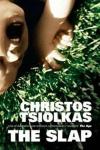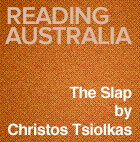AustLit
-
The Slap by Christos Tsiolkas is a novel that examines social mores, conflict and domestic life in early-21st century Melbourne. The book stirred significant debate among readers and was adapted into a successful television series.
– Part One of this trail examines the broad appeal of the book and the discussion it generated.
– Part Two examines multiculturalism and cosmopolitanism in The Slap and in Tsiolkas's work more generally.
– Part Three examines the connections between sexuality and politics that appear in The Slap and Tsiolkas's earlier work. The trail concludes with book reviews, interviews, and suggestions for further reading. Some of these critical works and other resources are available to read online.
Click the hyperlinks in the citations below to be taken to the full text.
-
 Image courtesy of Allen & UnwinSee full AustLit entry
Image courtesy of Allen & UnwinSee full AustLit entry'At a suburban barbecue, a man slaps a child who is not his own.
'This event has a shocking ricochet effect on a group of people, mostly friends, who are directly or indirectly influenced by the event.
'In this remarkable novel, Christos Tsiolkas turns his unflinching and all-seeing eye onto that which connects us all: the modern family and domestic life in the twenty-first century. The Slap is told from the points of view of eight people who were present at the barbecue.
(...more) -
 Image by permission of the National Library of Australia: http://nla.gov.au/nla.obj-136364288See full AustLit entry
Image by permission of the National Library of Australia: http://nla.gov.au/nla.obj-136364288See full AustLit entryChristos Tsiolkas, the son of Greek migrants, lived in a working class, predominantly Greek, Melbourne inner city suburb and attended state schools including Blackburn High School. He completed an Arts degree at the University of Melbourne in 1987 and has worked as a novelist, essayist, screenwriter, and playwright.
Christos has been shortlisted for several awards including the Miles Franklin Literary Award, and won many awards including the Australian Literary Society Gold Medal and the Melbourne Best Writing Award.
-
 Screencap from promotional trailer.'The series starts at an Australian backyard BBQ. Amongst alcohol, friendship and a children's cricket game a man slaps a child who is not his son. The party comes to a sudden halt. The child's parents are so affronted they vow to take the man to court. As the series unfolds the police become involved and friends and family are forced to take sides. One cousin is forced to testify against another. Couples are caught in the crossfire. Beliefs are tested and relationships strained.See full AustLit entry
Screencap from promotional trailer.'The series starts at an Australian backyard BBQ. Amongst alcohol, friendship and a children's cricket game a man slaps a child who is not his son. The party comes to a sudden halt. The child's parents are so affronted they vow to take the man to court. As the series unfolds the police become involved and friends and family are forced to take sides. One cousin is forced to testify against another. Couples are caught in the crossfire. Beliefs are tested and relationships strained.See full AustLit entry
'The story is told through the points of view of eight characters as the court case proceeds, as affairs begin and end, as a pregnancy is decided and marriages morph and change. (...more)The Slap was adapted into a television series that aired in 2011.
-
In October 2013, the Sydney Morning Herald reported that The Slap had sold 300,000 copies in Australia, a massive number in comparison to average domestic book sales. The book was avidly taken up by book clubs and individual readers around the nation, stirring debates about parenting, Australian society, and ethics––as the resources below demonstrate.
-
'This article discusses consumerism, liberalism and the middle class in The Slap, arguing that 'it is a novel about the failings of middle-class life'.' (...more)See full AustLit entry
This article discusses consumerism, liberalism and the middle class in The Slap, arguing that 'it is a novel about the failings of middle-class life'.
Skidelsky, Will. 'The Slap, a Novel That is Bringing Out the Worst in the Middle Class.' The Guardian 22 Aug. 2010. Online at http://www.theguardian.com/commentisfree/2010/aug/22/will-skidelsky-the-slap-success. Sighted 4/12/13.
-
In this blog post, Bethanie Blanchard discusses the structure and style of the book and its television adaptation. She also discusses some of the controversy generated by both versions. (...more)See full AustLit entry
In this blog post, Bethanie Blanchard discusses the structure and style of the book and its television adaptation. She also discusses some of the controversy generated by both versions.
Blanchard, Bethanie. 'Australian Stories: ABC TV's The Slap.' Kill Your Darlings blog. 7 Oct. 2011. Online at http://www.killyourdarlingsjournal.com/2011/10/australian-stories-abc-tvs-the-slap/. Sighted 4/12/13.
-
'At the Antipodes Writers Festival (Melbourne) 2012's opening event, Christos Tsiolkas, multi-award winning author of Loaded, Dead Europe and The Slap, speaks to cultural theorist, Professor Nikos Papastergiadis (School of Culture and Communication, University of Melbourne). In this excerpt, edited by Prof. Papastergiadis, they discuss Tsiolkas’ work in the context of multiculturalism and cosmopolitanism – the focus of Papastergiadis's recent book Cosmopolitanism and Culture 2012; they also discuss hospitality, belonging and Australian culture. (...more)See full AustLit entry
This interview was recorded and can be viewed online courtesy of Slow TV.
Papastergiadis, Nikos and Tsiolkas, Christos. 'Hospitality, Multiculturalism and Cosmopolitanism: A Conversation between Christos Tsiolkas and Nikos Papastergiadis.' Journal of Intercultural Studies 34.4 (2013): 387-398.
-
'This article discusses Australian author Christos Tsiolkas’ novel The Slap (2008) and its television adaptation (2011). The latter is situated in relation to Television Studies debates relating to ‘quality’, with elements of the adaptation that enable its categorization as ‘quality TV’ highlighted. Tsiolkas, whose novels all prominently feature Greek-Australian characters, has described The Slap as a response to John Howard’s period as Prime Minister (1996–2007). The article thus examines in detail particular policies produced in Australia during those years, and the competing discourses relating to ‘multiculturalism’, which were in circulation. (...more)See full AustLit entry
Davis, Glyn. 'The Slap's Resonances: Multiculturalism and Adolescence in Tsiolkas' Australia.' Interactions : Studies in Communication & Culture 3.2 (2012): 173-186.
-
Critics have noted that Tsiolkas's representations of sex and sexuality relate also to his books' political and ideological concerns. The resources below discuss these links, and Tsiolkas himself discusses the politics of his work in the interview below.
-
Putting Tsiolkas's works into a wider context of international writing, the essay is concerned with 'the fictional tradition that either deploys the pornographic, or evokes what might be called a pornographic sensibilty, in order to articulate forms of political and aesthetic radicality' (32). (...more)See full AustLit entry
McCann, Andrew. 'Christos Tsiolkas and the Pornographic Logic of Commodity Capitalism.' Australian Literary Studies 25.1 (2010): 31-41.
-
Interview by Antony Loewenstein
In this discussion with Antony Loewenstein at the Ubud Writers and Readers Festival, Tsiolkas discusses vulgarity in writing, writing for a diverse audience and not only the educated, and whether success means changing the way he writes. He also discusses what writing means to him, and how he is influenced by political engagement.
//www.youtube.com/embed/NbP95S34tVA -
Discusses Christos Tsiolkas's treatments of notions of discipline, especially in relation to issues of sexuality. (...more)See full AustLit entry
Mathews, Peter. 'The Virtue of Self-Discipline: Reading Tsiolkas and Foucault.' Westerly 57.1 (2012): 209-223.
-
See full AustLit entry
'On the publication of The Slap, Christos Tsiolkas has become a major figure in the literary life of Australia and beyond. This article examines whether this novel continues the concerns of his earlier fiction, especially those of his first novel Loaded, or whether, in style, content and characterisation, it abandons what many would see as a predominantly queer literary and political project in favour of addressing the concerns of mostly middle-class and straight inner-suburban Melburnians.
(...more)Treagus, Mandy. 'Queering the Mainstream: The Slap and "Middle" Australia.' JASAL 12.3 (2012):
-
See full AustLit entry
Denes writes about the style of and characterisation in The Slap, with a particular focus on the anger and sex in the book. Denes argues that the novel is 'one-dimensional,' and the 'characters lapse too regularly into cliché, the language of teen fiction, porn or advertising.'
(...more)Denes, Melissa. 'Freakazoid.' Rev. of The Slap, by Christos Tsiolkas. London Review of Books 32.16 (19 Aug. 2010): 26-28. Online at http://www.lrb.co.uk/v32/n16/melissa-denes/freakazoid. Sighted 2/12/2013.
-
See full AustLit entry
Ashton discusses narrative technique and the notion of family in Tsiolkas's The Slap, Cunningham's Bird, Flanagan's Wanting, Leigh's Disquiet, and Lohrey's Vertigo. The review spends most time on The Slap, and Ashton argues that the novel's focus on family should be seen not as a flight from politics, but as 'a flight to the politics of the middle-class family' (93).
(...more)Ashton, Kalinda. 'Forms of Hunger and Hysteria: Recent Australian Fiction.' Overland 194 (2009): 93-96.
-
See full AustLit entry
Starford argues that Tsiolkas's novels are characterised by urgency and 'irate energy' (171), but that The Slap has too many points of view, and that the characters of Rosie and Gary do not receive a 'nuanced portrait' (172).
(...more)Starford, Rebecca. 'Fading Irate Energy.' Rev. of The Slap, by Christos Tsiolkas. Antipodes 22.2 (2008): 171-172.
-
See full AustLit entry
In a wide-ranging interview, Tsiolkas discusses film and television adaptations of his work, critical reception of his work, his politics, the role of sex in his books, and what the description of his books as 'controversial' might mean.
(...more)Johnson, Heather Taylor. 'Me and My Country: Where to Now?' Interview with Christos Tsiolkas. Meanjin 72.1 (2013): 178-188. Online at http: http://meanjin.com.au/articles/post/me-and-my-country-where-to-now/. Sighted 02/12/2013.
-
Interview by Sophie Cunningham
In this interview with Sophie Cunningham, Tsiolkas talks about his approach to generational issues, class, and writing about parenting despite having no children himself.
//www.youtube.com/embed/eEsI_QNnoc4 -
See full AustLit entry
Tsiolkas discusses political correctness, characterisation, and prejudice. He also talks about whether literature voices what is left unsaid in relationships, and discusses his literary influences.
(...more)Meyer, Angela. 'Discomfort is Sometimes What is Most Precious to Me About Great Art.' Interview with Christos Tsiolkas. Crikey Jan. 29 2009. Literary Minded blog. Online at http://blogs.crikey.com.au/literaryminded/2009/01/29/discomfort-is-sometimes-what-is-most-precious-to-me-about-great-art-christos-tsiolkas-on-the-slap/. Sighted 03/12/2013.
You might be interested in...





